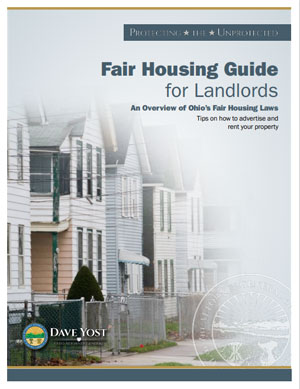
April 2023 Issue
What Housing Providers Need to Know:
Understanding Fair Housing Law
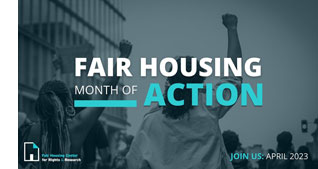 April is National Fair Housing Month! The greater Cleveland area is lucky to have the Fair Housing Center for Rights & Research, one of the best such organizations in the country. It focuses on three major activities:
April is National Fair Housing Month! The greater Cleveland area is lucky to have the Fair Housing Center for Rights & Research, one of the best such organizations in the country. It focuses on three major activities:
- conducting research on housing and lending patterns in Northeast Ohio and throughout the state.
- conducting fair housing law seminars and events for landlords, property managers, real estate professionals, social workers, attorneys, government officials, newspaper publishers, and others.
- enforcing fair housing laws, including compensating victims, detecting discrimination, and deterring future acts of discrimination.
During April, they are promoting the Fair Housing Month of Action to expand everyone's fair housing knowledge so we can all become better advocates for housing justice. Daily challenges, resources, and activities are at www.thehousingcenter.org/action.
The photos and quotes below are from the Center's "Voices of Fair Housing" webpage. These are very short videos that describe the impact of housing discrimination on people who have lived it. We encourage you to visit the page at www.thehousingcenter.org/voices.
You can learn more about the topics below by clicking on the links or visiting the Center's website at www.thehousingcenter.org. For specific issues and questions, you can also contact them at 216-361-9240 or education@thehousingcenter.org.
Fair Housing Is a Civil Right
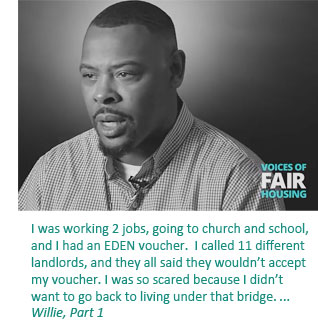 Landlords must abide by fair housing laws. It is illegal to discriminate in housing, deny housing, or make housing unavailable based on a protected class. This also means you cannot charge more or limit housing options to people based on:
Landlords must abide by fair housing laws. It is illegal to discriminate in housing, deny housing, or make housing unavailable based on a protected class. This also means you cannot charge more or limit housing options to people based on:
- Race
- Color
- National Origin
- Sex (including sexual orientation and gender identity)
- Disability (includes both physical and mental health disabilities)
- Religion
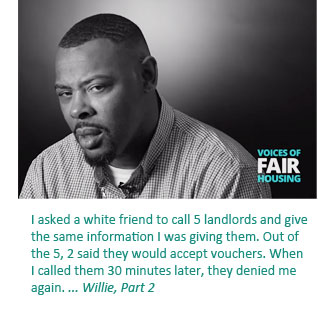 Familial Status (the presence of children under the age of 18)
Familial Status (the presence of children under the age of 18)
Ohio has identified two additional protected classes:
- Ancestry
- Military Status
In addition, many local laws prohibit discrimination based on:
- Marital Status
- Creed
- Age
- Source of Income
What is Prohibited?
The Fair Housing Act covers most housing. In very limited circumstances, the Act exempts owner-occupied buildings with no more than four units, single-family houses sold or rented by the owner without the use of an agent, and housing operated by religious organizations and private clubs that limit occupancy to members.
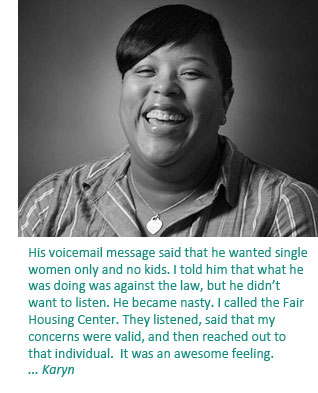 It is illegal discrimination to take any of the following actions because of race, color, religion, sex (including gender identity and sexual orientation), disability, familial status, or national origin:
It is illegal discrimination to take any of the following actions because of race, color, religion, sex (including gender identity and sexual orientation), disability, familial status, or national origin:
- Refuse to rent or sell housing
- Refuse to negotiate for housing
- Otherwise make housing unavailable
- Set different terms, conditions or privileges for sale or rental of a dwelling
- Provide a person different housing services or facilities
- Falsely deny that housing is available for inspection, sale or rental
- Make, print or publish any notice, statement or advertisement with respect to the sale or rental of a dwelling that indicates any preference, limitation or discrimination
- Impose different sales prices or rental charges for the sale or rental of a dwelling
- Use different qualification criteria or applications, or sale or rental standards or procedures, such as income standards, application requirements, application fees, credit analyses, sale or rental approval procedures or other requirements
- Evict a tenant or a tenant’s guest
- Harass a person
- Fail or delay performance of maintenance or repairs
- Limit privileges, services or facilities of a dwelling
- Discourage the purchase or rental of a dwelling
- Assign a person to a particular building or neighborhood or section of a building or neighborhood
- Persuade, or try to persuade, homeowners to sell their homes by suggesting that people of a particular protected characteristic are about to move into the neighborhood (blockbusting)
- Refuse to provide or discriminate in the terms or conditions of homeowners insurance
A Few Examples of Discrimination
 Restricting families with children to the first floor units, or specific buildings
Restricting families with children to the first floor units, or specific buildings - Refusing to rent to people with children under a certain age or stating a limit on the number of children in a household
- Saying “No Section 8” where prohibited by local law
- Not responding to people of certain races when they inquire about renting, while responding to others
- Refusing to permit or charging a pet deposit for a service or assistance animal
- Refusing to rent to someone because of their gender identity or sexual orientation
- Refusing to rent to people who are not U.S. citizens
- Having a rental policy that automatically denies anyone with a felony conviction
- Refusing to rent to someone because of their faith
Consequences of Discrimination
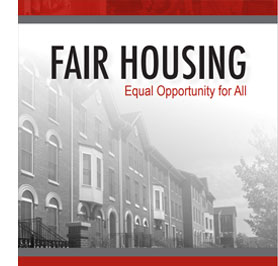 The Fair Housing Center offers free assistance to victims in the administrative complaint process. Our advocates are available to assist victims of housing discrimination in a variety of ways, which may include providing education on their rights, investigating a complaint, engaging with a housing provider on a tenant’s behalf, or supporting victims in exercising their fair housing rights.
The Fair Housing Center offers free assistance to victims in the administrative complaint process. Our advocates are available to assist victims of housing discrimination in a variety of ways, which may include providing education on their rights, investigating a complaint, engaging with a housing provider on a tenant’s behalf, or supporting victims in exercising their fair housing rights.
Cases filed by the Fair Housing Center have resulted in conciliation agreements, civil penalties and affirmative action agreements with individual housing providers throughout Greater Cleveland.
See the booklet published by HUD—Fair Housing: Equal Opportunity for All—for more information about the law and the penalties that can be imposed on violators.
Courses for You and Your Staff
 FREE IN-PERSON/VIRTUAL COURSE: Fair Housing for Landlords and Rental Property Owners
FREE IN-PERSON/VIRTUAL COURSE: Fair Housing for Landlords and Rental Property Owners
FREE ONLINE COURSE: What Every Landlord Should Know: Criminal Records & Fair Housing
Do you know someone who may be interested in receiving
EDEN's eNews for Property Owners & Managers?
Forward this email to them so they can register for our announcements.
Frequently Asked Questions
How are EDEN vouchers different than regular Section 8/HUD vouchers?
EDEN’s goal is to eliminate the threat of homelessness for vulnerable populations and help them retain safe housing. Unlike those with standard housing vouchers, EDEN clients have access to an entire team of case managers and stability specialists who focus on assisting them not only with access to, but also maintenance of, their homes.
EDEN connects with community resources and support services—financial management, mental health counseling, general health care, and others—to reduce or eliminate factors which may jeopardize their residency. EDEN calls on partners such as Frontline, The Nord Center, and literally dozens of other community-based agencies to assure tenants receive the support they need to sustain safe housing.
Stability Specialists at EDEN work quickly with tenants and housing providers—not just on the phone or email, but in-person—to identify and resolve issues, especially those that could lead to eviction.
We encourage you to reach out to us if you have any questions or want additional information. Click here to email our Community Housing Agents or call the property owner hotline at 216-503-6369.
![]()
Watch the Video about Our Program for Housing Providers & Property Managers
We want to partner with you!
EDEN has a robust program to help property owners and managers to attract and retain renters for their properties. We encourage you to reach out to us if you have any questions or want additional information. Click here to email our Community Housing Agents or call the property owner hotline at 216-503-6369.
![]()
Submit Your Questions
Click here to ask a question. We will answer them in our February issue.
![]()
Resources for Housing Providers & Managers
Brochure for Housing Providers
Housing Provider Information Web Page
Fair Housing Center for Rights & Research
Lead Safe Cleveland
(see section for financial assistance)
Tenant & Housing Provider Duties
![]()
Ohio's Fair Housing Guide for Landlords
Includes:
Advertising
Screening potential tenants
Reasonable accommodations
Families with children
Animal assistants
Recognizing an animal assistant
Common questions
![]()
Scheduled for
Our May Issue
Completing the RFLA

